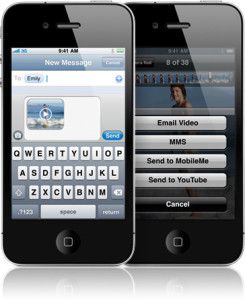- Qualcomm Launches Snapdragon 4 Gen 2 Mobile Platform
- AMD Launches Ryzen PRO 7000 Series Mobile & Desktop Platform
- Intel Launches Sleek Single-Slot Arc Pro A60 Workstation Graphics Card
- NVIDIA Announces Latest Ada Lovelace Additions: GeForce RTX 4060 Ti & RTX 4060
- Maxon Redshift With AMD Radeon GPU Rendering Support Now Available
AT&T iPhone vs. Verizon iPhone
Verizon’s iPhone hit the market earlier this month, and though we know some of the limitations, is it worth jumping over to from AT&T? The answer depends a lot on what you want to do with your phone, and if you happen to make a lot of phone calls and often get disconnected on AT&T, then that’s the biggest reason that Verizon should be considered. To help round out the rest of the picture though, Ars Technica took each version of the iPhone on a trip around Chicago to gather some real-world results.
In the site’s tests, the overall consensus is that the AT&T iPhone is faster overall at most anything, with an exception of the Verizon model being faster in some cases with regards to online video. For downloading, AT&T could be up to twice as fast, and the same goes for latencies as well.
Ars also tested out the “Hotspot” feature of the Verizon iPhone, which allows you to create a WiFi hotspot for people (or your devices) to connect to so that they could take advantage of your 3G connection. At $20 a month, it’s a rather intriguing option if you can take advantage of it, but the downside is that you can’t take a call and have the the 3G connection still operate, thanks to the limits of the CDMA technology.
The choice between AT&T and Verizon seems to boil down to two things… importance of call stability, and the ability for a hotspot. If you are not super-concerned with having the fastest download speeds, Verizon’s iPhone does seem rather attractive.

It’s worth noting that not all phone-call-related behaviors are the same between the AT&T and Verizon iPhones thanks to the limitations of CDMA. Apple has posted a support document to outline the differences when dealing with things like call waiting, caller ID, conference calls, and putting a call on hold. (“CDMA networks do not offer the ability to place a call on hold,” Apple writes. So, hope you weren’t planning on doing that on your Verizon iPhone anytime soon.)




